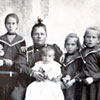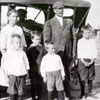Gustav Krikental
 Gustav Krikental left the Crimea in 1903 with his wife Julie (Paarmann) and their five children: Pauline (Lena), Julia, Mary, August and Mihkel. The family traveled on the SS Lake Erie from Liverpool to Quebec and then took a train to the South Dakota Estonian settlement at Fort Pierre.
Gustav Krikental left the Crimea in 1903 with his wife Julie (Paarmann) and their five children: Pauline (Lena), Julia, Mary, August and Mihkel. The family traveled on the SS Lake Erie from Liverpool to Quebec and then took a train to the South Dakota Estonian settlement at Fort Pierre.
The Krikentals were in search of new beginnings: Gustav's grandfather had been a serf on the Kulli farm in Estonia, and Gustav's father had immigrated (on foot) to Crimea from Estonia in 1861-63 because of political and economic troubles.
In the spring of 1904 the Krikentals and several other Estonian immigrants from Fort Pierre took the settlers' train to Lethbridge. From there they traveled to their homesteads at Barons on horseback. The homesteaders brought livestock, farm equipment and supplies with them on the train. They had only the short summer to build a home and shelters for their animals, and to grow a garden to provide some food for winter.
Julie Krikental died in 1906 after giving birth to a sixth child, Margaret. Jacob Erdman, one of the more prosperous settlers in the area, donated part of his land for Julie's burial and a community cemetery. Hence, Julie is the first person to be buried in the Barons cemetery.
Gustav's second wife, Liisa Reiner, came to Barons from Estonia in 1909 with the intention of marrying Gustav. The couple had conducted a courtship by mail.
In 1910 the Krikentals and several other Barons families moved back to the United States - to Chester, Montana, 130 miles south. Drought conditions prevailed in this area for a number of years after the Barons settlers arrived. They had to cope with repeated crop failures and great financial hardship.
 By 1918 Gustav was defeated. His second wife (Liisa) had died, and his debts were piling up. Gustav was forced to place his younger children (which now included two children by his second wife, Charlie and Edward) in the Twin Bridges Orphans' Home. By that time his son August was working at the Anaconda copper mining company in Great Falls and several of the older daughters were married with families of their own.
By 1918 Gustav was defeated. His second wife (Liisa) had died, and his debts were piling up. Gustav was forced to place his younger children (which now included two children by his second wife, Charlie and Edward) in the Twin Bridges Orphans' Home. By that time his son August was working at the Anaconda copper mining company in Great Falls and several of the older daughters were married with families of their own.
Gustav lost touch with his children after that. Letters mailed from the orphanage were returned, marked "Undeliverable." Gustav's disappearance almost certainly had to do with his need to avoid the debt collectors. Recent genealogical research reveals that he went to Chicago in the 1920s and worked in a sugar refinery and cigar factory. The records also show that he died in Blue Island, Illinois, in 1938.








